AWM41 1072 - [Official History, 1914-18 War: Records of Arthur G Butler:] Interviews containing accounts of Nursing experiences in the AANS [Australian Army Nursing Service]. These nurses were interviewed by Matron Kellett - Part 14
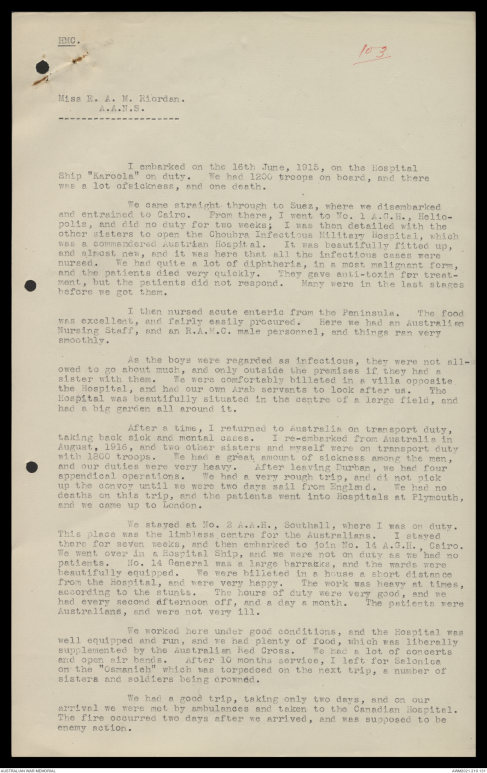
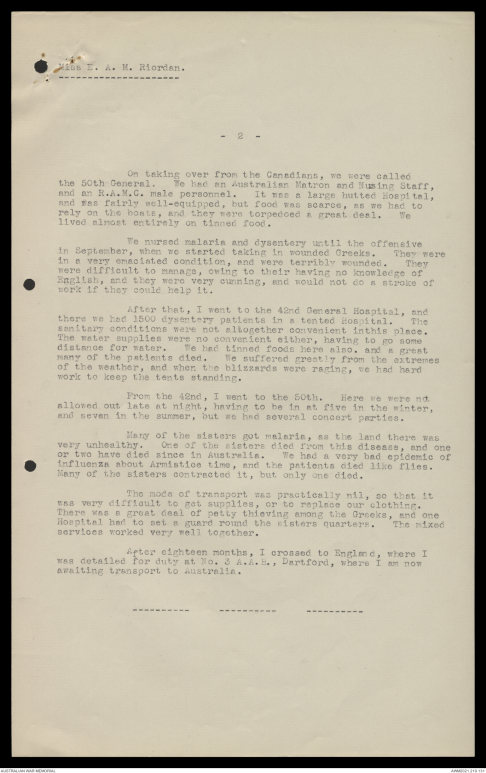
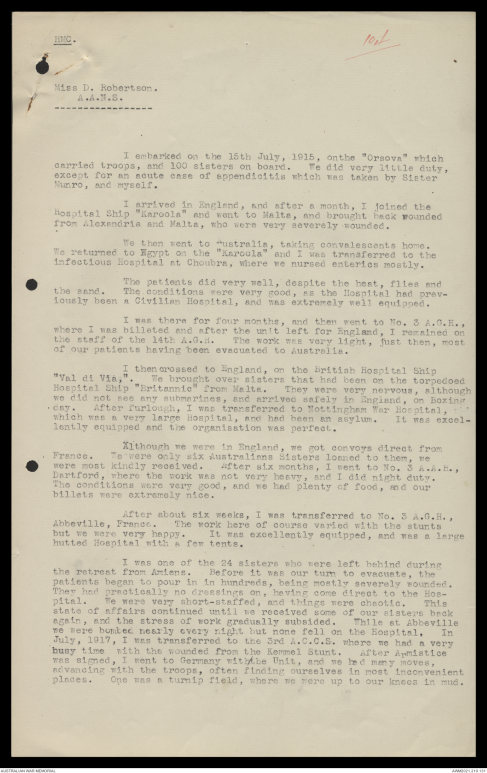
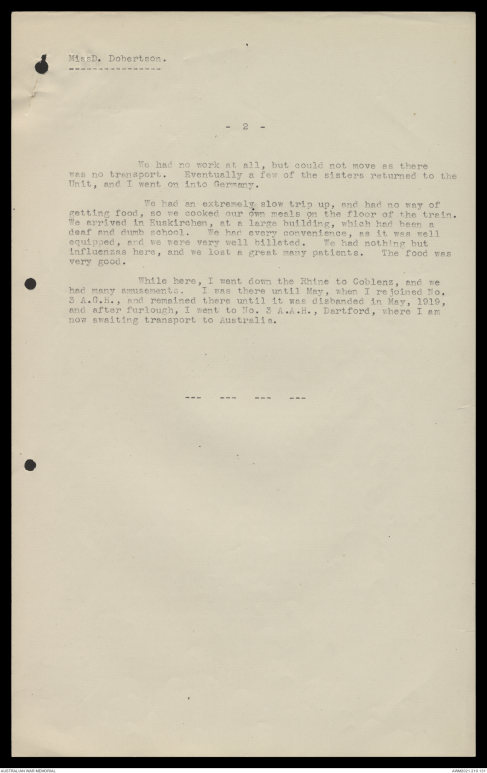
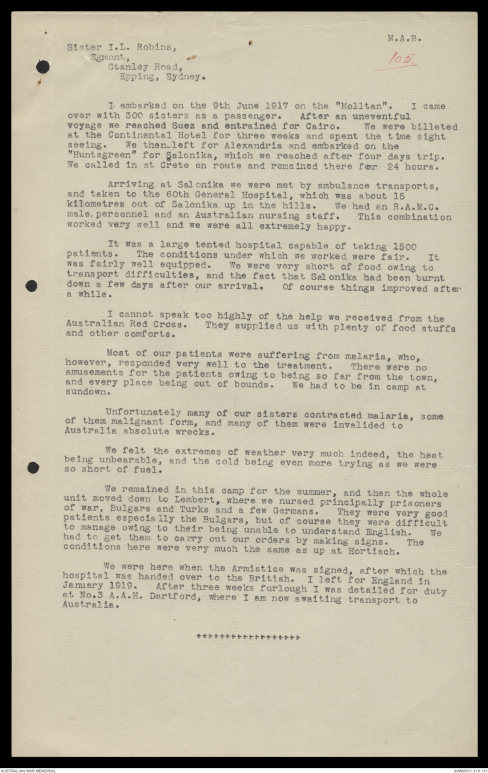
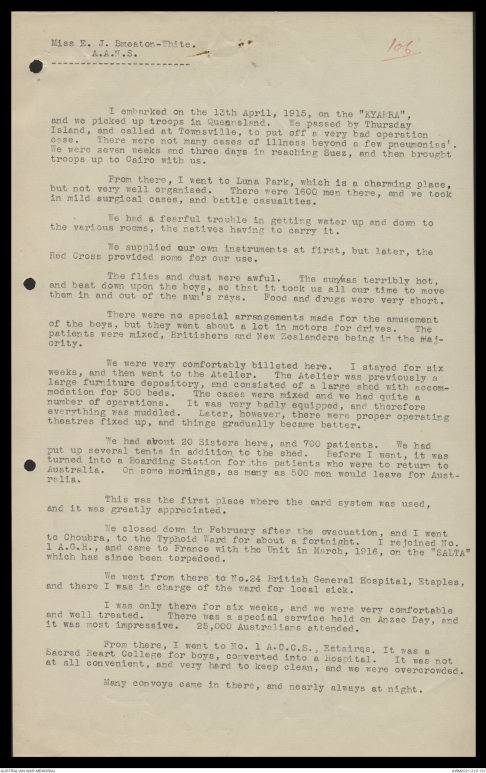
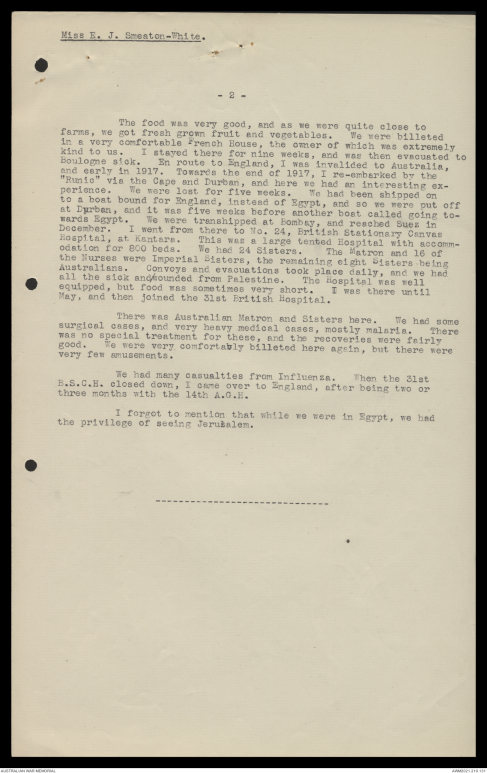
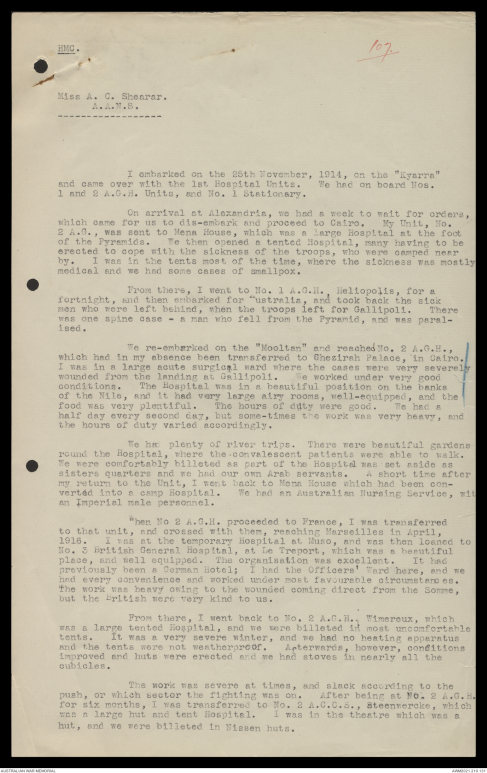
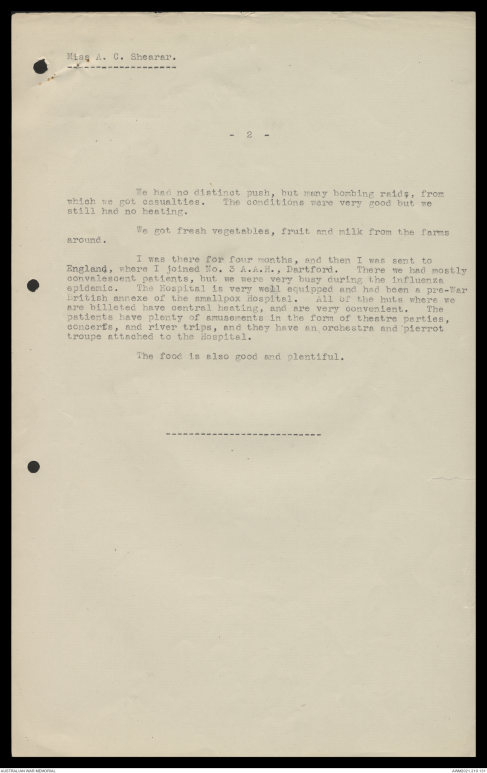
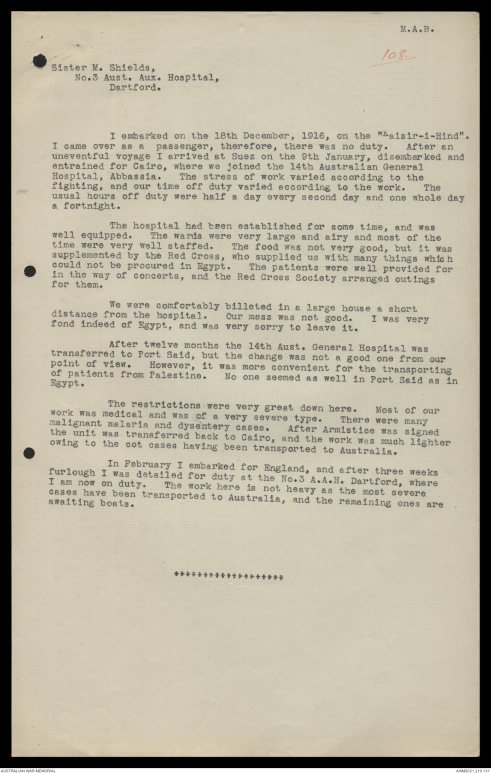
HMC
10.3
MIss R. A. M. Riordon.
A.A.N..S.
-----------------------------
I embarked on the 16th June, 1915, on the Hospital
Ship "Karoola" on duty. We had 1200 troops on board, and there
was a lot of sickness, and one death.
We came straight though to Suez, where we disembarked
and entrained to Cairo. From there, I went to No. 1 A.G.H., Heliopolis,
and did no duty for two weeks; I was then detailed with the
other sisters to open the Choubra Infectious Military Hospital, which
was a commandered Austrian Hospital. It was beautifully fitted up,
and almost new, and it was here that all the infectious cases were
nursed. We had quite a lot of diphtheria, in a most malignant form,
and the patients died very quickly. They gave anti-toxin for treatment,
but the patients did not respond. Many were in the last stages
before we got them.
I then nursed acute enteric from the Peninsula. The food
was excellent, and fairly easily procured. Here we had an Australian Nursing Staff, and an R.A.M.C. male personnel, and things ran very
smoothly.
As the boys were regarded as infectious, they were not allowed
to go about much, and only outside the premises if they had a
sister with them. We were comfortably billeted in a villa opposite
the Hospital, and had our own Arab servants to look after us. The
Hospital was beautifully situated in the centre of a large field, and
had a big garden all around it.
After a time, I returned to Australia on transport duty,
taking back sick and mental cases. I re-embarked from Australia in
August, 1916, and two other sisters and myself were on transport duty
with 1800 troops. We had a great amount of sickness among the men,
and our duties were very heavy. After leaving Durban, we had four
appendical operations. We had a very rough trip, and di not pick
up the convoy until we were two days sail from England. We had no
deaths on this trip, and the patients went into Hospitals at Plymouth,
and we came up to London.
We stayed at No. 2 A.A.H., Southall, where I was on duty.
This place was the limbless centre for the Australians. I stayed
there for seven weeks, and then embarked to join No. 14 A.G.H., Cairo.
We went over in a Hospital ship, and we were not on duty as we had no
patients. No. 14 General was a large barracks, and the wards were
beautifully equipped. We were billeted in a house a short distance
from the Hospital, and were very happy. The work was heavy at times,
according to the stunts. The hours of duty were very good, and we
had every second afternoon off, and a day a month. The patients were Australians, and were not very ill.
We worked here under good conditions, and the Hospital was
well equipped and run, and we had plenty of food, which was liberally
supplemented by the Australian Red Cross. We had a lot of concerts
and open air bends. After 10 months service, I left for Selonica
on the "Osmanieh" which was torpedoed on the next trip, a number of
sisters and soldiers being drowned.
We had a good trip, taking only two days, and on our
arrival we were met by ambulances and taken to the Canadian Hospital.
The fire occurred two days after we arrived, and was supposed to be
enemy action.
Miss R.A.M. Riordan
-2-
On taking over from the Canadians, we were called
the 50th General. We had an Australian Matron and Nursing Staff,
and an R.A.M.C. male personnel. It was a large hutted Hospital,
and was fairly well-equipped, but food was scarce, as we had to
rely on the boats, and they were torpedoed as great deal. We
lived almost entirely on tinned food.
We nursed malaria and dysentery until the offensive
in September, when we started taking in wounded Greeks. They were
in a very emaciated condition, and were terribly wounded. They
were difficult to manage, owing to their having no knowledge of
English, and they were very cunning, and would not do a stroke of
work if they could help it.
After that, I went to the 42nd General Hospital, and
there we had 1500 dysentery patients in a tented Hospital. The
sanitary conditions were not altogether convenient in this place.
The water supplies were no convenient either, after having to go some
distance for water. We had tinned foods here also, and a great
many of the patients died. We suffered greatly from the extremes
of the weather, and when the blizzards were raging, we had hard
work to keep the tents standing.
From the 42nd, I went to the 50th. Here we were not
allowed out late at night, having to be at five in the winter,
and seven in the summer, but we had several concert parties.
Many of the sisters got malaria, as the land there was
very unhealthy. One of the sisters died from this disease, and one
or two have died since in Australia. We had a very bad epidemic of
influenza about Armistice time, and the patients died like flies.
Many of the sisters contracted it, but only one died.
The mode of transport was practically nil, so that it
was very difficult to get supplies, or to replace our clothing.
There was a great deal of petty thieving among the Greeks, and one
Hospital had to set a guard round the sister quarters. The mixed
services worked very well together.
After eighteen months, I crossed to England, where I
was detailed for duty at N0 3 A.A.H., Dartford, where I am now
awaiting transport to Australia.
----------------- ------------- -----------
HMC.
104
Miss D. Robertson.
A.A.N.S.
-------------------------
I embarked on the 15th July 1915, on the "Orsova" which
carried troops and 100 sisters on board. We did very little duty,
except for an acute case of appendicitis which was taken by Sister
Munro and myself.
I arrived in England, and after a month, I joined the
Hospital Ship "Karoola" and went to Malta, and brought back wounded
from Alexandria and Malta, who were severely wounded.
We then went to Australia, taking convalescents home.
We returned to Egypt on the "Karoola" and I was transferred to the infectious Hospital at Choubra, where we nursed enterics mostly.
The patients did very well, despite the heat, flies and
the sand. The conditions were very good, as the Hospital had prev-
iously been a Civilian Hospital,, and was extremely well equipped.
I was there for four months, and then went to No. 3 A.G.H.,
where I was billeted and after the unit left for England, I remained on
the staff of the 14th A.G.H. The work was very light, just then, most
of our patients having been evacuated to Australia.
I then crossed to England, on the British Hospital Ship
"Val di Via". We brought over sisters that had been on the torpedoed
Hospital Ship "Britannic" from Malta. They were very nervous, although
we did not see any submarines, and arrived safely in England, on Boxing
day. After furlough, I was transferred to Nottingham War Hospital,
which was a very large Hospital, and had been an asylum. It was excel-
lenty equiped and the organisation was perfect.
Although we were in England, we got convoys direct from
France. We were only six Australians Sisters loaned to them, we
were most kindly received. After six months, I went to No. 3 A.A.H.,
Dartford, where the work was not very heavy, and I did night duty.
The conditions were very good, and we had plenty of food, and our
billets were extremely nice.
After about six weeks, I was transferred to No 3 A.G.H.,
Abbeville, France. The work here of course varied with the stunts
but we were very happy. It was excellently equipped, and was a large
hutted Hospital with a few tents.
I was one of the 24 sisters who were left behind during
the retreat from Amiens. Before it was our turn to evacuate, the
patients began to pour in in hundreds, being mostly severely wounded.
They had practically no dressings on, having come direct to the Hos-
pital. We were very short-staffed, and things were chaotic. This
state of affairs continued until we received some of our sisters back
again, and the stress of work gradually subsided. While at Abbeville
we were bombed nearly every night but none fell on the Hospital. In
July, 1917, I was transferred to the 3rd A.C.C.S. where we had a very
busy time with the wounded from the Kemmel Stunt. After Armistice
was signed, I went to Germany with the Unit, and we had many moves,
advancing with the troops, often finding ourselves in most inconvenient
places. One was a turnip field, where we were up to our knees in mud.
Miss D. Robertson.
-----------------------
-2-
We had no work at all, but could not move as there
was no transport. Eventually a few of the sisters returned to the
Unit, and I went on into Germany.
We had an extremely slow trip up , and had no way of
getting food, so we cooked our meals on the floor of the train.
We arrived in Euskirchen, at a large building, which had been a
deaf and dumb school. We had every convenience, as it was well
equipped, and we were very well billeted. We had nothing but
influenzas here, and we lost a great many patients. The food was
very good.
While here, I went down the Rhine to Coblenz, and we
had many amusements. I was there until May, when I rejoined No.
3 A.G.H., and remained there until it was disbanded in May 1919,
and after furlough, I went to N0. 3 A.A.H., Dartford, where I am
now awaiting transport to Australia.
--- ---- --- ---
M.A.B.
105
Sister I. L. Robins
Egmont,
Stanley Road,
Epping, Sydney
I embarked on the 9th June 1917 on the "Molltan". I came
over with 300 sisters as a passenger. After an uneventful
voyage we reached Suez and entrained for Cairo. We were billeted
at the Continental Hotel for three weeks and spent the time sight
seeing. We then left for Alexandria and embarked on the
"Huntsgreen" for Salonika, which we reached after four days trip.
We called in at Crete en route and remained there for 24 hours.
Arriving at Salonika we were met by ambulance transports,
and taken to the 60th General Hospital, which was about 15
kilometres out of Salonika up in the hills. We had an R.A.M.C.
male personnel and an Australian nursing staff. This combination
worked very well and we were all extremely happy.
It was a large tented hospital capable of taking 1500
patients. The conditions under which we worked were fair. It
was fairly well equipped. We were very short of food owing to
transport difficulties, and the fact that Salonika had been burnt
down a few days after our arrival. Of course things improved after
a while.
I cannot speak too highly of the help we received from the
Australian Red Cross. They supplied us with plenty of food stuffs
and other comforts.
Most of our patients were suffering from malaria, who,
however, responded very well to the treatment. There were no
amusements for the patients owing to being so far from the town,.
and every place being out of bounds. We had to be in camp at
sundown.
Unfortunately many of our sisters contracted malaria, some
of them malignant form, and many of them were invalided to
Australia absolute wrecks.
We felt the extremes of weather very much indeed, the heat
being unbearable, and the cold being even more trying as we were
so short of fuel.
We remained in this camp for the summer, and then the whole
unit moved down to Lembert, where we nursed principally prisoners
of war, Bulgars and Turks and a few Germans. They were very good
patients especially the Bulgars, but of course they were difficult
to manage owing to their being unable to understand English. We
had to get them to carry out our orders b y making signs. The
conditions here were very much the same as up at Hortisch.
We were here when the Armistice was signed, after which the
hospital was handed over to the British. I left for England in
January 1919. After three weeks furlough I was detailed for duty
at No. 3 A.A.H. Dartford, where I am now awaiting transport to
Australia.
------------------------
106
Miss E. J. Smeaton-White
A.A.N.S.
--------------------------------
I embarked on the 13th April, 1915, on the "KYARRA",
and we picked up troops in Queensland. We passed by Thursday
Island, and called at Townsville, to put off a very bad operation
case. There were not many cases of illness beyond a few pneumonias'
We were seven weeks and three days in reaching Suez, and then brought
troops up to Cairo with us.
From there, I went to Luna Park, which is a charming place,
but not very well organised. There were 1600 men there, and we took
in mild surgical cases, and battle casualties.
We had a fearful trouble getting water up and down to
the various rooms, the natives having to carry it.
We supplied our own instruments at first, but later, the
Red Cross provided some for our use.
The flies and dust were awful. The sun was terribly hot,
and beat down upon the boys, so that it took us all our time to move
them in and out of the sun's rays. Food and drugs were very short.
There were no special arrangements made for the amusement
of the boys, but they went about a lot in motors for drives. The
patients were mixed, Britishers and New Zealanders being in the maj-
ority.
We were very comfortably billeted here. I stayed for six
weeks, and then went to the Atelier. The Atelier was previously a
large furniture depository, and consisted of a large shed with accom-modation for 500 beds. The cases were mixed and we had to had quite a
number of operations. It was very badly equipped, and therefore
everything was muddled. Later, however, there were proper operating
theatres fixed up, and things gradually became better.
We had about 20 Sisters here, and 700 patients. We had
put up several tents in addition to the shed. Before I went, it was
turned into a Boarding Station for the patients who were to return to Australia. On some mornings, as many as 500 men would leave for
Australia.
This was the first place where the card system was used,
and it was greatly appreciated.
We closed down in February after the evacuation, and I went
to Choubra, to the Typhoid Ward for about a fortnight. I rejoined No.
1 A.G.H. and came to France with the Unit in March 1916, on the "SALTA"
which has since been torpedoed.
We went from there to No. 24 British General Hospital, Etaples,
and there I was in charge of the ward for local sick.
I was only there for six weeks, and we were very comfortable
and well treated. There was a special service held on Anzac Day, and
it was most impressive. 25,000 Australians attended.
From there, I went to No. 1 A.C.C.S. Estaires. It was a Sacred Heart College for boys, converted into a hospital. It was not
at all convenient, and very hard to keep clean, and we were overcrowded.
Many convoys came in there, and nearly always at night.
Miss E. J. Smeaton-White.
-2-
The food was very good, and and as we were quite close to
farms, we got fresh grown fruit and vegetables. We were billeted
in a very comfortable French House, the owner of which was extremely
kind to us. I stayed there for nine weeks, and was then evacuated to
Boulogne sick. En route to England, I was invalided to Australia,
and early in 1917. Towards the end of 1917, I re-embarked by the
"Runic" via the Cape and Durban, and here we had an interesting
experience. We were lost for five weeks. We had been shipped on
to a boat bound for England, instead of Egypt, and so we were put off
at Durban, and it was five weeks before another boat called going
towards Egypt. We were transhipped at Bombay, and reached Suez in December. I went from there to No. 24, British Stationary Canvas
Hospital at Kantara. This was a large tented Hospital with accomm-
odation for 800 beds. We had 24 Sisters. The Matron and 16 of
the Nurses were Imperial Sisters, the remaining eight Sisters being
Australians. Convoys and evacuations took place daily, and we had
all the sick and wounded from Palestine. The Hospital was well
equipped, but food was sometimes very short. I was there until
May, and then joined the 31st British Hospital.
There was Australian Matron and Sisters here. We had some
surgical cases, and very heavy medical cases, mostly malaria. There
was no special treatment for these, and the recoveries were fairly
good. We were very comfortably billeted here again, but there were
very few amusements.
We had many casualties from Influenza. When the 31st
B.S.C.H. closed down, I came over to England, after being two or
three months with the 14th A.G.H.
I forgot to mention that while we were in Egypt, we had
the privilege of seeing Jerusalem.
_______________________________
HMC
107
Miss A. C. Shearer.
A.A.N.S.
I embarked on the 25th November, 1914, on the :Kyarra"
and came over with the 1st Hospital Units. We had on board Nos.
1 and 2 A.G.H. Units, and No. 1 Stationary.
On arrival at Alexandria, we had a week to wait for orders,
which came for us to dis-embark and proceed to Cairo. My Unit No.
2 A.G. was sent to Mena House, which was a large Hospital at the foot
of the Pyramids. We then opened a tented Hospital, many having to be
erected to cope with the sickness of the troops, who were camped near
by. I was in the tents most of the time where the sickness was mostly
medical and we had some cases of smallpox.
From there I went to No. 1 A.G.H. Heliopolis, for a
fortnight, and then embarked for "ustralia", and took back the sick
men who were left behind, when the troops left for Gallipoli. There
was one spine case - a man who fell from the Pyramid, and was paral-
ised.
We re-embarked on the "Mooltan" and reached No. 2 A.G.H.,
which had in my absence been transferred to Chezirah Palace, in Cairo.
I was in a large acute surgical ward where the cases were very severely
wounded from the landing at Gallipoli. We worked under very good
conditions. The Hospital was in a beautiful position on the banks
of the Nile, and it had very large airy rooms, well-equipped, and the
food was very plentiful. The hours of duty were good. We had a
half day every second day, but some-times the work was very heavy, and
the hours of duty varied accordingly.
We had plenty of river trips. There were beautiful gardens
round the Hospital, where the convalescent patients were able to walk.
We were comfortably billeted as part of the Hospital was set aside as
sisters quarters and we had our Arab servants. A short time after
my return to the unit, I went back to Mena House which had been con-
verted into a camp Hospital. We had an Australian Nursing Service, with
an Imperial male personnel.
When No 2 A.G.H. proceeded to France, I was transferred
to that unit, and crossed with them, reaching Marseilles in April,
1916. I was at the temporary Hospital at Muso, and was then loaned to
No.3 British General Hospital, at Le Treport, which was a beautiful
place and well equipped. The organisation was excellent. It had
previously been a German Hotel; I had the Officers Ward here, and we
had every convenience and worked under most favourable circumstances.
The work was heavy owing to the wounded coming direct from the Somme, but the British were very kind to us.
From there, I went back to No. 2 A.G.H. Wimereux which
was a large tented Hospital, and we were billeted in most uncomfortable
tents. It was a very severe winter, and we had heating apparatus
and the tents were not weatherproof. Afterwards, however, conditions
improved and huts were erected and we had stoves in nearly all the cubicles.
The work was severe at times, and slack according to the
push, or which sector the fighting was on. After being at No.2 A.G.H.
for six months, I was transferred to N0. 2 A.C.C.S. Steenvereke, which
was a large hut and tent Hospital. I was in the theatre which was a
hut, and we were billeted in Nissan huts.
Miss A.C. Shearer.
----------------------
-2-
We had no distinct push, but many bombing raids, from
which we got casualties. The conditions were very good but we
still had no heating.
We got fresh vegetables, fruit and milk from the farms
around.
I was there for four months, and then I was sent to
England, where I joined No. 3 A.A.H. Dartford. There we had mostly
convalescent patients, but we were very busy during the influenza
epidemic. The Hospital is very well equipped and had been a pre-War
British annexe of the smallpox Hospital. All of the huts where we
are billeted have central heating, and we are very convenient. The
patients have plenty of amusements, in the form of theatre parties,
concerts, and river trips, and they have an orchestra and pierrot
troupe attached to the Hospital
The food is also good and plentiful.
--------------------------------
M.A.B.
108
Sister M. Shields
No 3 Aust. Aux. Hospital
Dartford.
I embarked on the 18th December, 1916, on the "Kaisir-i-Hind".
I came over as a passenger, therefore, there was no duty. After an
uneventful journey I arrived at Suez on the 9th January, disembarked and
entrained for Cairo, where we joined the 14th Australian General
Hospital, Abbassia. The stress of work varied according to the
fighting, and our time off duty varied according to the work. The
usual hours off duty were half a day every second day and one whole day
a fortnight.
The hospital had been established for some time, and was
well equipped. The wards were very large and airy and most of the
time were very well staffed. The food was not very good, but it was
supplement by the Red Cross, who supplied us with many things which
could not be procured in Egypt. The patients were well provided for
in the way of concerts, and the Red Cross Society arranged outings
for them.
We were comfortably billeted in a large house a short
distance from the hospital. Our mess was not good. I was very
fond indeed of Egypt, and was sorry to leave it.
After twelve months the 14th Aust. General Hospital was
transferred to Port Said, but the change was not a good one from our
point of view. However, it was more convenient for the transporting
of patients from Palestine. No one seemed as well in Port Said as in
Egypt.
The restrictions were very great down here. Most of our
work was medical and was of a very severe type. There were many
malignant malaria and dysentery cases. After Armistice was signed
the unit was transferred back to Cairo, and the work was much lighter
owing to the cot cases having been transported to Australia.
In February I embarked for England, and after three weeks
furlough, I was detailed for duty at the No. 3 A.A.H. Dartford, where
I am now on duty. The work here is not heavy as the most severe
cases have been transported to Australia, and the remaining ones are
awaiting boats.
---------------------------------
 Sam scott
Sam scottThis transcription item is now locked to you for editing. To release the lock either Save your changes or Cancel.
This lock will be automatically released after 60 minutes of inactivity.